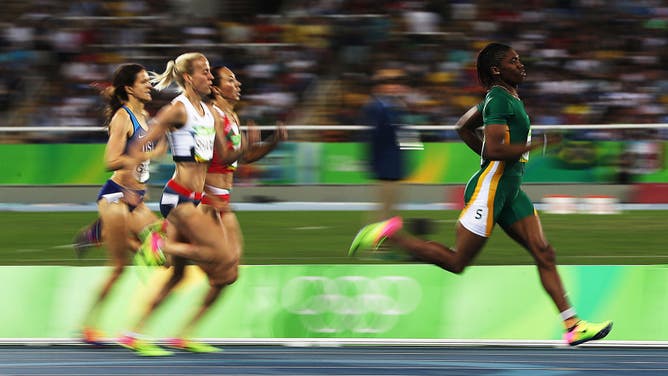A Win For Women: World Athletics Bans Transgender Athletes From Female Events
World Athletics — the international governing body for track and field — has officially banned transgender athletes from competing in all women's events.
The decision overturns an initial proposal, filed in January, that would allow biological men to compete against women if they recorded a low testosterone level.
"The World Athletics Council has today taken decisive action to protect the female category in our sport," WA President Sebastian Coe said.

President of World Athletics Sebastian Coe (Photo by Steph Chambers/Getty Images)
Coe has long been an advocate for biological women in the sport.
In March 2022, Coe said that "gender cannot trump biology" and "fairness is non-negotiable."
With this ruling, World Athletics followed suit from World Aquatics. Last year, the international swimming federation also barred trans women from competing in the female category altogether.
"Our instinct was that, while there was uncertainty about that science, we decided that it was impossible to maintain the transgender regulations at the level that they were," Coe said.
Under previous World Athletics rules, any transgender competitor must have had a blood testosterone level below 5 nanomoles per liter for at least 12 months. And while there are currently no trans athletes competing internationally in the sport, the new regulations ensure that women's events will be protected for years to come.
"I think that was the right decision," Coe said. "We weren’t prepared to risk the female category."
The ban will take effect on March 31, although Coe acknowledged it could face legal challenge.
A Much-Needed Win For Female Athletes
Before World Athletics made the decision to ban trans athletes from women's events, many female track stars spoke out. Team Great Britain's Beth Dobbin, Emily Diamond and Ellie Baker said existing rules were unfair to female athletes due to biological advantages.
In the past few years, biological men have entered the female space and dominated their sport. And many leagues have allowed the unfair advantage — in the name of "inclusivity."
OutKick's Dan Zaksheske recently spoke to Valerie McClain, a former U.S. Olympian in rowing and member of the women’s advocacy group ICONS (Independent Council on Women’s Sports).
McClain said she believes trans women should be allowed to play sports. But not at the expense of women. And it doesn't matter how often it happens.
"If you allow a male to invade the space of a group of females, that male will be dominant," she said. "And that male will displace a female. If one male displaces one female, that is a threat."
World Athletics also tightened its regulations on DSD athletes.
Differences of sex development (or DSD) is a phrase used for very rare conditions in which a person is born with reproductive or sexual anatomy that doesn’t fit the typical definitions of female or male. The word "intersex" is also used.
Under new regulations, DSD athletes must reduce their blood testosterone level to below 2.5 nanomoles per liter. They have to remain under this threshold for two years in order to compete internationally in the female category in any track and field event.
This particular rule change could affect South African Olympian Caster Semenya. Semenya will now have to undergo hormone-suppressing treatment for six months before competing to be eligible.
Semenya told the Guardian a few years ago she will never take hormones again because "it’s taking the soul out of my body."

South Africa's Caster Semenya (in green) is a DSD track and field athlete. (Photo by Ian MacNicol/Getty Images)
Following the decisions, The Associated Press reported it expects these two rulings by World Athletics to "stoke outrage."
Outrage from who, exactly? Outrage from biological men who want an unfair advantage? From intersex athletes who openly admit elevated testosterone improves performance? Or outrage from mainstream media outlets who never miss an opportunity for a good virtue signal?
Because, personally, I care a lot more about outrage from biological female athletes who deserve an opportunity to excel in their own space.
Kudos to you, World Athletics.